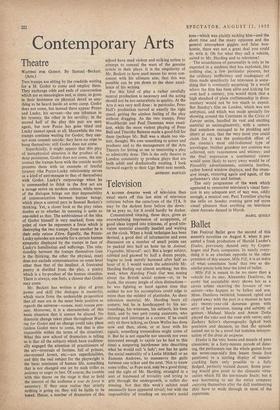Contemporary Arts
Theatre
WAITING FOR GODOT. By Samuel Beckett. (Arts.)
Two tramps are sitting by the roadside waiting for a M. Godot to come and employ them. They exchange odds and ends of conversation which are as meaningless and, at times, as gross in their insistence on physical detail as any- thing to be heard inside an army camp. Godot does not come, but instead there appear Pozzo and Lucky, his servant—the one inhuman in his tyranny, the other in his servility; in the second half of the play this pair are seen again, but now Pozzo has gone blind and Lucky cannot speak at all. Meanwhile the two tramps continue waiting for Godot; they can- not even commit suicide; they have no rope to hang themselves; still Godot does not come.
Superficially, it might appear that this play of metaphysical situation is the product of a deep pessimism. Godot dots not come, the one contact the tramps have with the outside world presents them with an example of fearful tyranny (the Pozzo-Lucky relationship serves as a kind of anti-masque to that of themselves) with Godot. Lucky's outpourings when he is commanded to think in the first act are a savage satire on modern culture, while most of the dialogue brings out that impossibility of communication between human beings, which plays a central part in Samuel Beckett's thinking. Yet, a closer look at the play raises doubts as to whether its meaning is quite so one-sided as that. The ambivalence of the idea of Godot himself is very marked; from one point of view he represents a force which is destroying the two tramps; from another he is their only raison d'être. Equally, the Pozzo- Lucky episodes are notable for a certain human sympathy displayed by the tramps in face of Lucky's humiliation and sufferings. The rela- tionship between the tramps themselves (one is the thinking, the other the physical, man) does not exclude communication on some level other than that of the intellect. •A frustrated poetry is distilled from the play, a poetry which is a by-product of the human situation. There is always, one feels, a chance that Godot may come.
Mr. Beckett has written a play of great power and skill (the dialogue is masterly), which starts from the undeniable proposition that all men are in the same basic position as regards the universe—roseau, mais roseau pen- sant. Moreover, it is a characteristic of this basic situation that it cannot be altered. No dramatic change takes place throughout Wait- ing for Godot and no change could take place (unless Godot were to come, but that is also impossible within the terms of the situation). What this new school of dramatists is telling us is that all the subjects which have tradition- ally engaged the attention of practitioners of the art—reversals of fortune, fall of princes, star-crossed lovers, etc.—are superficialities, and that the real subject for the playwright is the basic minimum of human life, something that is not changed one jot by such trifles as jealousy or anger or lust. Of course, the trouble with this theme on the stage is that to hold the interest of the audience a tour de force is necessary. If they once realise that strictly nothing is going on, they will be liable to be bored. Hence, a number of dramatists of this
school have used violent and striking action to attempt to conceal the want of the genuine article in their plays. It is the singularity of Mr. Beckett to have used means far more con- sonant with his ultimate aim; that this was possible can he put down to the sheer excel- lence of his writing.
For this kind of play a rather carefully neutral production is necessary and the acting should not be too naturalistic in quality. At the Arts it was very well done : in particular, Peter Hall's production moved at exactly the right speed, getting the aimless feeling of the play without dragging. As the two tramps, Peter Woodthorpe and Paul Daneman were excel- lent, while the more violent playing of Peter Bull and Timothy Bateson made a good foil for them (perhaps Mr. Bull was a shade too vio- lent, though). We owe something to actors and producer and to the management of the Arts Theatre for letting us see so interesting a play so admirably done. This is the only theatre in London constantly tp produce plays that are both adult and dramatically exciting. I look forward eagerly to their Ugo Betti next month.
ANTHONY HARTLEY


































 Previous page
Previous page